Seattle Buddhists Deepen Awareness of Racism
Written by: Denis Martynowych
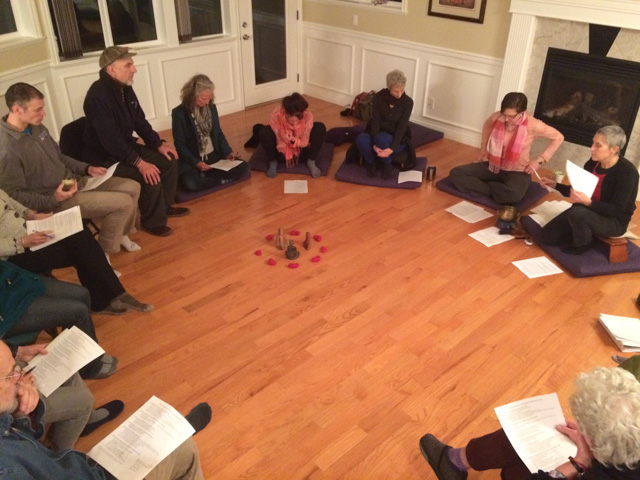
Ruby Phillips, right, reads to the people gathered at the White Awake group.
Photos by: Denis Martynowych
About 20 Seattle Buddhist practitioners have been meeting over five weeks, learning to use mindfulness practice to bring more awareness to issues of racism.
Each of the meetings is a focused exploration, with topics including: personal experience of race, four levels of racism, explicit bias, and white fragility.
In our practice, we learn to sit with whatever arises rather than spiraling into reactivity, numbness or denial. We gradually learn to replace judgment with investigation and curiosity.
Curiosity opens new doors to education and exploration that further deepens our understanding. All of these practices are extraordinarily useful in addressing racism.
We will continue this work at a Day of Mindfulness for White Allies at Seattle Insight Meditation Society, on June 25.
This day of mindfulness will be open to white people from any Buddhist group interested in deepening their understanding of this topic, and in helping make their communities more diverse. The phrase “white allies” refers to people supporting and allying with people of color.
The day of mindfulness will be free. A donation (dana) will be requested to support the center and the continuation of this work. Preregistration not required.
White people open to their racism
This effort grew out of the People of Color and Allies Sangha (POCAS), a weekly practice group in Seattle that set aside one Thursday evening a month for people of color and white allies to meet separately.
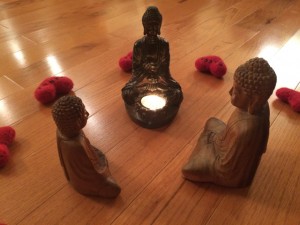
Holding the center of the circle were three Buddhas.
As much as we value evenings when we are all practicing together, the time to meet in our respective identity group has proven very valuable. It offers a special level of safety to discuss issues still difficult to raise in mixed groups.
For example, the allies group is exploring how issues like white privilege, shame and denial, can surface in subtle and not-so-subtle ways in our interactions with people of color.
We found useful information and other resources at White Awake: Developing Race Awareness for the Benefit of All. From their website:
“It is our firm belief that inner transformation and outer action go hand in hand. A powerful complement to White Awake is Showing up for Racial Justice (SURJ), a national network of groups and individuals organizing white people for racial justice. Whereas White Awake is designed to support self-education and inner transformation, SURJ focuses on building community, accountable relationships with POC-led organizations, and moving into action.”
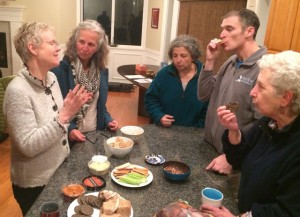
Vivien Sharples speaks during a snack break.
Far too often in our dharma communities and in the wider world, the difficult challenge of raising awareness of racism falls on the shoulders of people of color. Progress towards overcoming the disease racism will accelerate considerably, once more and more white people express in their words and actions how fundamental to their own liberation is ending racism.
When more white people make this whole-hearted commitment, our dharma communities will not only become safer and more inviting to people of color, they will also become richer, more powerful and effective vehicles for everyone’s liberation. This wisdom can have a positive ripple effect far beyond our dharma communities as well.
Some years ago I went to visit the Museum of Tolerance in Los Angeles, where there are two doors into the exhibits.
One door is marked “prejudiced” and the other “unprejudiced.” Anyone who tries to go through the unprejudiced door finds it will not open. Instead, a sign lights up that says, “Think… Now use the other door.”
This is an effective reminder that all of us have prejudices we need to address, before we are truly free of hurting others and ourselves.
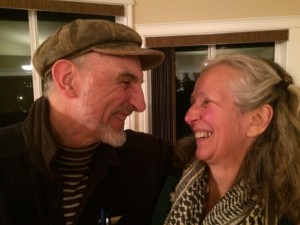
Diane Hetrick and Rick Harlan share a moment of laughter.
Racism is a pernicious form of prejudice. Throughout human history, racism has functioned to separate humans from one another and to justify the oppression of one group over another. Racism is a fabricated form of suffering, dukkha, which is deeply entrenched in our personal lives, our institutions and our culture.
Racism is so pervasive and historic that no one is to blame for being racist. However, we are all responsible for ending it. The teachings of mindfulness and compassion offer many useful practices in that effort.
The Buddha acted against prejudice
As an expression of his enlightenment, and out of his commitment to teach others how to free themselves from suffering, the Buddha stood up against the racism and classism of his era. He accepted anyone into his community of spiritual seekers, a sharp contrast to the rigid caste system at the time.
Although Buddhism was virtually extinct in India by the 19th century, today it is experiencing a revival, especially in the Dalit (untouchable) community.
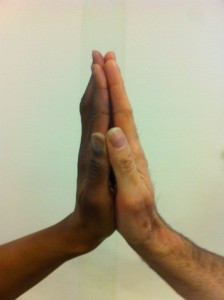
No matter our color, we touch one another.
Dalits, who are at the bottom of Hinduism’s hereditary hierarchy, are embracing Buddhism as way to overcome the oppressive grip of the caste system. The Buddha always emphasized that enlightenment was available to anyone who followed the eight-fold path.
Mindfulness helps us see what is happening the present moment more clearly. Concentration helps us stay grounded even when unpleasant or confusing feelings arise. The practices of loving-kindness and compassion open our hearts and deepen our commitment to end suffering.
People are increasingly using these and other gifts of our Buddhist practices to help those interested in overcoming racism in themselves and in our culture.
May we face racism awake and with right view
May we all be free of the pain and suffering caused by racism.
And from Desmond Tutu, former bishop of the Anglican Church of South Africa:
“My humanity is bound up in yours, for we can only be human together”
For more information contact: Denis Martynowych denismarty@gmail.com (206) 201-6596, or Ruby Phillips rubydoobe@gmail.com (206) 323-5503.
